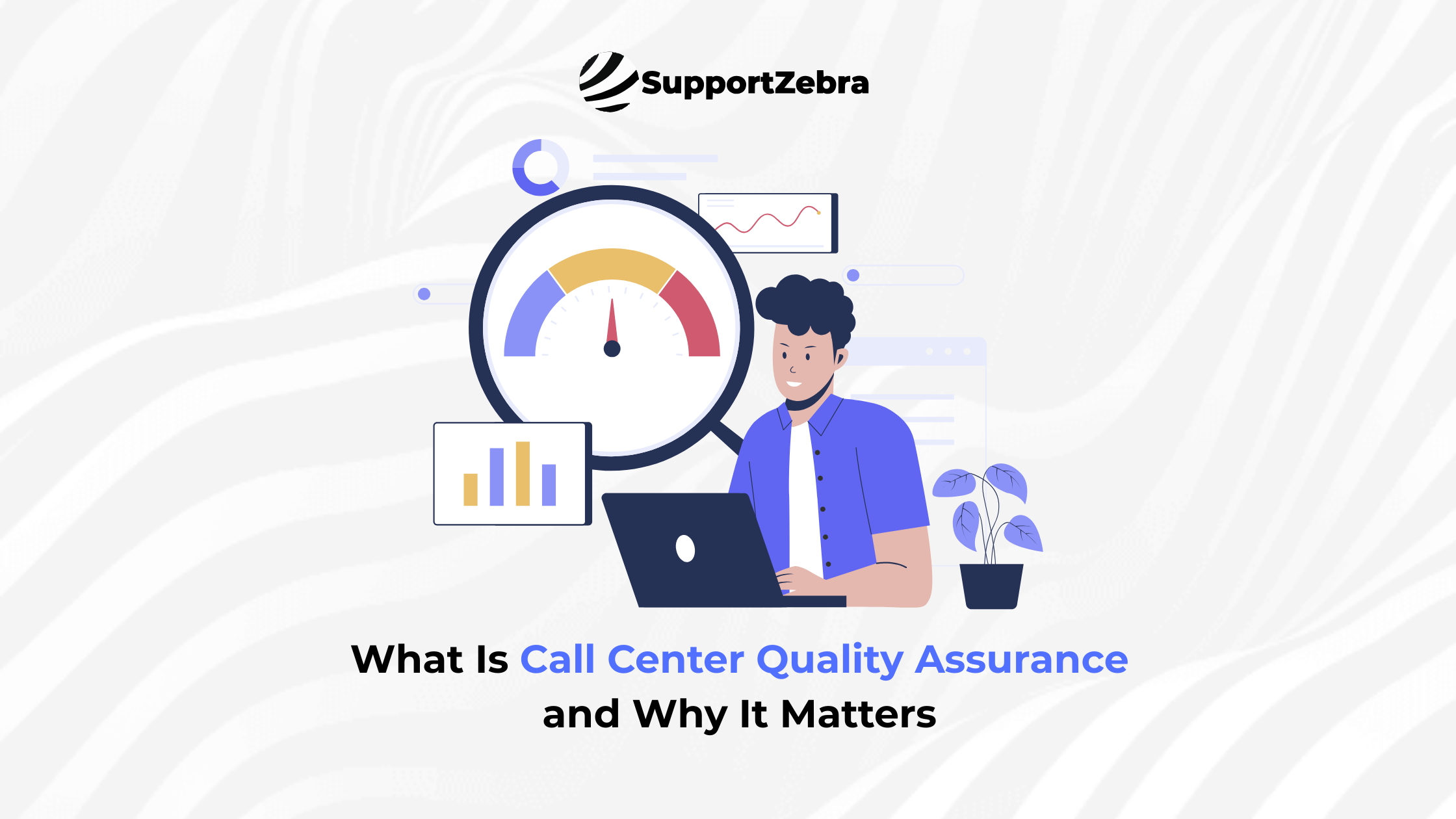Understanding Call Center Quality Assurance and Its Importance
Key Takeaways:
- Call center quality assurance helps fix service issues before they harm your brand.
- A strong QA program leads to better agent performance and happier customers.
- QA uses tools, metrics, and reviews to track what works and what doesn’t.
- Good QA covers all channels, not only phone calls.
- Working with SupportZebra can make your QA process stronger and easier to scale.
Frustrated by plummeting customer satisfaction scores? You’re not the only one. When your call center operations are faltering, the repercussions extend far beyond a single negative interaction. Subpar customer engagements directly catalyze client attrition, inflict brand degradation, and precipitate a tangible decrement in revenue.
This is the critical function of quality assurance in call centers. It’s not a luxury; it’s an imperative framework for systematically overhauling customer interactions. This methodology is the definitive solution for rectifying these core operational deficiencies, securing customer allegiance, and driving fiscal performance.
What Is Call Center Quality Assurance?
Call center quality assurance is the process of checking and improving every customer interaction. It helps you see if agents follow the right steps, use the right tone, and provide accurate information.
QA teams listen to calls or review messages to make sure agents meet set standards. When done well, QA stops poor service from becoming a pattern and sets the foundation for consistent support.
Why Is Quality Assurance Important in a Call Center?
Quality assurance matters because customer interactions can make or break your business. One bad call can lead to bad reviews, churn, or even legal issues.
QA lets you catch problems early and fix them fast. It also keeps your agents aligned with company goals. A strong QA program helps you deliver service that builds trust, drives loyalty, and protects your brand name.
How Does Quality Assurance Improve Customer Satisfaction?
QA boosts customer satisfaction by making every interaction more reliable. When agents are trained with clear standards, customers receive faster and more accurate solutions. QA also reduces long hold times, repeated calls, and confusing responses.
As a result, customers feel valued and understood. Better service means fewer complaints and more positive experiences across the board.

What Are the Key Components of a Call Center QA Program?
A strong QA program has several must-have components, including:
- Scorecards that track behaviour and accuracy
- Coaching sessions to correct gaps
- Call monitoring for real-time reviews
- Clear guidelines for tone and compliance
- Regular audits to keep standards aligned
Each part works together to help teams stay consistent and improve over time.
How Do QA Teams Evaluate Agent Performance?
QA teams check agent performance by reviewing recorded or live calls. They score each call based on set criteria, such as accuracy, tone, empathy, and policy compliance. After scoring, they share feedback with the agent. This helps the agent understand what to fix and what to keep doing. Consistent evaluations make sure the whole team keeps getting better.
What Metrics Are Typically Used in Call Center Quality Assurance?
Common QA metrics include:
- Quality scores based on scorecards
- First call resolution to track how fast issues are fixed
- Average handling time to measure efficiency
- Customer satisfaction ratings from surveys
These metrics help leaders see where the support team excels and where it needs help.
What Tools or Software Are Used for Call Center QA?
QA teams often use software that can record calls, transcribe conversations, and score interactions. These tools make it simple to find trends, track repeat issues, and automate reports. Some tools even use AI to detect tone, keywords, and compliance risks. With the right software, QA becomes faster, more accurate, and easier to scale.
What Are Common Challenges in Call Center QA?
Some common challenges include lack of time, unclear standards, and inconsistent coaching. Many teams struggle with large call volumes and not enough reviewers.
Others find it hard to keep guidelines updated. Without organized systems, QA becomes slow and reactive. These challenges make it even more crucial to have a structured program.
Does QA Only Apply to Phone Calls or Other Channels Too?
QA applies to every support channel, not just phone calls. This includes email, chat, social media, and even in-app support. Customers expect the same level of service everywhere.
A strong QA program checks each channel to make sure the support team delivers clear, helpful, and consistent responses.
How Does Improving QA Impact Overall Business Performance?
Better QA leads to better service, and better service leads to higher customer loyalty. When customers are happy, they stay longer, buy more, and spread positive feedback.
Improved QA also reduces errors, escalations, and rework. This cuts costs and boosts team productivity. In short, strong QA drives both customer satisfaction and long-term revenue.
How Can Partnering With SupportZebra Help Improve Call Center Quality Assurance for Growing Businesses?
SupportZebra helps growing businesses by offering skilled QA teams, clear processes, and advanced tools. They monitor interactions, build scorecards, and coach agents based on real data. Their support makes it easier to scale your QA program without losing quality. With their help, your team can deliver better service faster and with fewer mistakes.
Reach Out Now and Let Us Help You Improve Your Customer Experience.
Call center quality assurance is more than a routine task. It is a core system that keeps your customer interactions strong and consistent. With the right standards, tools, and guidance, your team can deliver service that builds trust and protects your brand. When QA works well, every part of your business feels the impact.
Reach out to us today and let’s strengthen your customer experience together.
Frequently Asked Questions
Call monitoring frequency depends on call volume, business goals, and agent experience. Typically, 2-4 calls per agent per month are monitored. With AI speech analytics, up to 100% of calls can be reviewed. New or struggling agents may have more frequent monitoring, such as weekly or biweekly.
QA reduces complaints by early identification of service issues, ensuring consistent quality, and providing actionable feedback to agents. Proactive QA helps prevent escalation of problems and improves customer satisfaction through better service reliability.
QA focuses on detailed evaluation of specific calls using scorecards and rigid criteria. QA Coaching goes further by using QA insights to support agent development, skill improvement, and sustained behavioral change through personalized feedback and guidance.
QA identifies training gaps and performance issues, which informs targeted training programs. It supports ongoing coaching by providing data-driven feedback and monitoring agent progress to improve skills over time.
Steps include defining quality standards, creating formal policies and procedures, documenting workflows, developing evaluation tools, performing regular monitoring, and continuously refining the process based on feedback and performance metrics.

